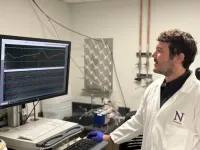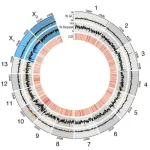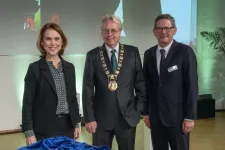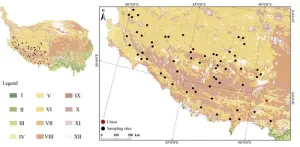(Press-News.org) BINGHAMTON, NY. -- Senior citizens are targeted by financial scams of all types, from email-based phishing attempts to callers looking to swindle their life savings.
A new paper from Binghamton University Associate Professor of Psychology Ian M. McDonough sheds light on how age-related changes may affect the way we handle finances — and how we can stay sharp as we age. “Separating neurocognitive mechanisms of maintenance and compensation to support financial ability in middle-aged and older adults: The role of language and the inferior frontal gyrus,” co-authored by Macarena Suárez-Pellicioni of the University of Alabama, was recently published in the Archives of Gerontology and Geriatrics.
The study focused on cognitively healthy adults ages 50 to 74, using MRI scans to measure brain structure and functional connectivity; study participants also engaged in simple financial tasks, such as balancing a checkbook or making change.
Financial tasks rely on multiple cognitive domains, including memory, executive functioning and numerical ability; aging can prompt subtle decline in all of these areas.
Earlier research that dealt with financial management and Alzheimer’s-related brain decline focused on the parietal cortex, the part of the brain involved in attention and simulating possible future outcomes, McDonough said. Little attention has been paid to the brain regions connected specifically with math processing, outside of the development of these regions in children.
Mathematics involves two different brain regions. One is the inferior frontal gyrus, which specifically deals with accessing math information contained in your memory.
“If I ask, ‘What’s 3 plus 3?’ you know it’s six; you don’t have to count 3 plus 3,” McDonough explained. “You have memorized this because of rote learning and years and years of it being embedded in you.”
If you don’t have a readily memorized answer and need to perform calculations, then your middle frontal gyrus kicks in. It uses more brainpower than memory and increases the possibility of error.
“When people are doing the calculation, they’re more likely to get it wrong. If you’ve memorized it, you’ve memorized the right answer,” McDonough said. “You’re faster, more efficient and more accurate when you have those verbal representations.”
The brain’s prefrontal cortex shrinks as a part of normal aging; with Alzheimer’s disease, the frontal cortex regions shrink even faster. As a result, individuals may start making more mistakes with financial tasks since their brains no longer rely on memorized answers and are instead recruiting different regions to compensate for deficiencies.
“They are potential markers that could show people’s increased vulnerability to scams,” he said. “If we understand how the brain changes, this can inform interventions used to target these brain regions.”
Preserving independence
Ultimately, successful financial management may rely more on language processing than sheer calculation. Individuals with better language skills were more likely to excel in financial tasks, the researchers found, likely because of increased connectivity between different parts of the brain.
McDonough’s research shows that higher household income and financial literacy — both markers of socioeconomic status — were the two main factors protecting against age-related declines in financial ability. Relying on memory requires that memories be developed in the first place, which is more likely in an environment where financial literacy is promoted.
Financial education may help people retain sharp decision-making abilities on the money front. Maintaining verbal automatic representations for math — essentially, practicing the math skills you learned in school — may be helpful in supporting good financial management throughout life.
Individuals and caregivers alike, however, also need to keep an eye out for cognitive declines that can make older adults more susceptible to financial scams and abuse. Financial tools, technologies and legal safeguards, such as power of attorney for automatic payment systems, can protect older adults while preserving their autonomy in decision-making.
“Managing finances is so important to maintaining independence later in life,” McDonough said. “We need to have interventions that can strengthen the brain and help keep people healthy when managing their finances.”
END
Staying sharp: Study explores how brain changes may affect financial skills
2024-12-16
ELSE PRESS RELEASES FROM THIS DATE:
Research Spotlight: Study shows males spend approximately 52 percent more time in bright light than females
2024-12-16
What Question Were You Investigating with this Study?
Are there sex-based differences in exposure to light?
Light is an important environmental exposure, as it is the primary cue for the circadian system and has other effects on health. Yet there is limited objective evidence characterizing population-wide personal light exposure patterns.
What Approach Did You Use?
We analyzed real-world light exposure (using wrist-worn devices) collected from 11,314 participants in the 2011 to 2014 U.S.-based National Health and Nutrition Examination Survey, with metrics reflecting the duration of and the timing of ...
New study finds marine animals save energy by swimming in a depth ‘sweet spot’
2024-12-16
R,esearchers from Swansea and Deakin Universities have found that marine animals across mammals, birds and reptiles swim at similar relative depths when travelling and not feeding to save energy.
Dr Kimberley Stokes, Professor Graeme Hays and Dr Nicole Esteban from Swansea and Deakin Universities, led research across six institutes in five countries comparing the swim depths of several sea turtle, penguin and whale species. All travelled at around three body depths from the surface in order to swim in the 'sweet spot' that minimises wave formation at the surface and vertical distance travelled.
Some semi-aquatic animals, such as mink, swim at the surface where wave generation ...
Breathing coordinates brain rhythms for memory consolidation during sleep
2024-12-16
The first time a breathing rhythm in the human hippocampus found during sleep
Breathing is the metronome that coordinates sleep oscillations
Findings are important for people with disordered breathing during sleep
Breathing is a fundamental rhythm of memory consolidation
CHICAGO --- Just as a conductor coordinates different instruments in an orchestra to produce a symphony, breathing coordinates hippocampal brain waves to strengthen memory while we sleep, reports a new Northwestern Medicine study.
This is the first time breathing rhythms during sleep have been linked to these hippocampal brain waves — called slow waves, spindles and ripples ...
Detailed bedbug genome analysis may improve pesticides
2024-12-16
Bedbugs. Just mentioning the tiny, biting insects that live on human blood and infest mattresses, couches, and bedding strikes fear into most people. In addition to the anxiety, itching, and rashes an outbreak can cause, bedbugs can be difficult to identify and expensive to treat.
Thanks to a new University of Texas at Arlington study published in the Journal of Heredity, scientists now have a better genetic understanding of the insect. The research offers an updated genome analysis of the common bedbug Cimex lectularius, providing new insight for those working to prevent bedbug infestation, develop remediation ...
Exploring the impact of probiotics on gut microbiota disruption caused by antibiotics
2024-12-16
Antibiotics are important clinical tools for treating bacterial infections, yet we recognize that an important side effect of antibiotic use is disruption of the microbial community living in the human gut. Antibiotics targeted against bacterial pathogens generally have the secondary effects of decreasing certain groups of bacteria and lowering gut microbiota diversity. Antibiotics are also associated with harms such as antibiotic associated diarrhea and C. difficile colitis. Probiotics have been shown to mitigate these clinical scenarios, but can probiotics help restore the microbiota?
In ...
Shrubs can help or hinder a forest’s recovery after wildfire
2024-12-16
Research from the University of California, Davis, is shedding light on when and where to plant tree seedlings to help restore forests after high-severity wildfires, and it has a lot to do with shrubs.
In hotter, drier areas where natural regeneration is weaker, well-timed tree planting can boost recovery by up to 200%, but the outcome also depends on competition with shrubs, a paper in the journal Forest Ecology and Management concludes.
“Generally, where there are more shrubs, the climate and soil are more hospitable for plant growth,” ...
DOE’s RENEW initiative to support seven Pathway Summer Institutes for Educators of underrepresented and underserved groups in STEM
2024-12-16
The U.S. Department of Energy’s (DOE) Office of Science (SC) will support nearly 85 educators who either teach at schools and community colleges with large populations of students historically underserved and/or underrepresented in STEM or are educators who are from groups traditionally underrepresented in STEM through awards for seven Pathway Summer Institutes for Educators at seven national laboratories.
The funding comes from SC’s Reaching a New Energy Sciences Workforce (RENEW) initiative (see details at https://science.osti.gov/initiatives/RENEW).
Sponsored by the Office of Workforce Development for Teachers and Scientists (WDTS), ...
Toward quantum for the real world: Photonic team in running for center-level funding
2024-12-16
Images
Michigan is a contender for a $50 million center aiming to build a quantum technology robust enough for the real world and demonstrate its utility. With a $1 million grant to explore options over the next year, the Michigan-led team is one of 11 funded in the first phase of the National Science Foundation's Quantum Science and Technology Demonstrations.
The team, whose project is called Quantum Photonic Integration and Deployment, or QuPID, aims to build the first chips that harness the incredible precision of light for real-world measurements in the field with quantum semiconductors. Working with leading industrial ...
Inaugural ceremony for KIT’s new president, Jan S. Hesthaven
2024-12-16
View this album for photos of the event.
Hesthaven, a 58-year-old Dane, noted in his inaugural speech that KIT had a duty to be of service to society and that it faced major changes and challenges. “Increased internationalization will play a key role. We need to ensure that KIT attracts talent not only from Germany but also from around the world,” he said. The President named three challenges confronting society: new health technologies for an aging population, the spread of artificial ...
Plant DNA metabarcoding unlocks vegetation secrets of the Tibetan plateau
2024-12-16
A recent study led by Dr. Li from Zhejiang Normal University, in collaboration with international researchers, reveals the potential of plant DNA metabarcoding for monitoring plant compositions on the Tibetan Plateau (TP). The study, published in Science China Earth Sciences, highlights the advantages of sedimentary DNA (sedDNA) extracted from lake sediments over traditional pollen analysis, providing a more detailed and localized perspective on vegetation monitoring and reconstruction.
The study involved the surface sediments from 59 small lakes and ponds located in the southwestern Tibetan Plateau. Using plant DNA metabarcoding, ...








